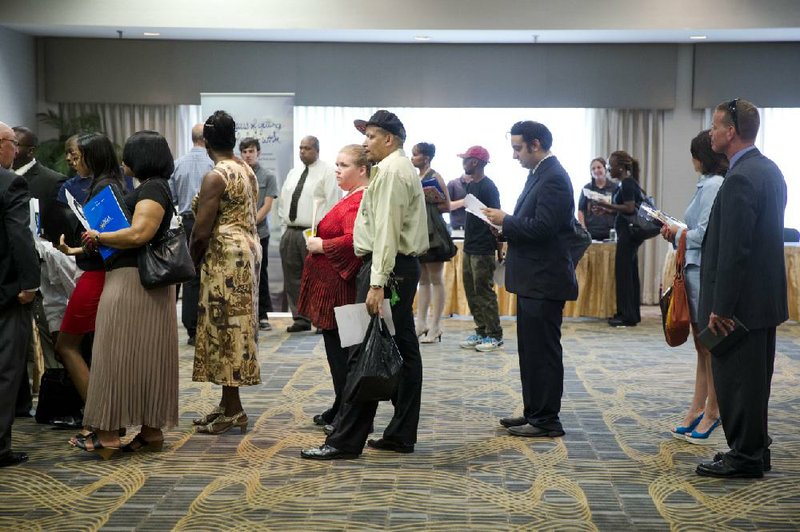WASHINGTON -- Fewer people applied for U.S. unemployment benefits last week, another sign the job market is improving.
The Labor Department said Thursday that weekly claims for benefits fell 14,000 last week to a seasonally adjusted 298,000. The prior week's figures were revised up slightly to 311,000.
The less volatile four-week average rose 4,750 to 300,750. It remains close to levels that predate the recession of 2007-09.
Applications are a proxy for layoffs.
"Readings at or below the [300,000] mark are extremely rare in an historical context," Robert Kavcic, senior economist at BMO Capital Markets, wrote in a note to clients. "Going back to 1990, we've seen it only for a short period during the height of the technology bubble and very briefly in early 2006 when the housing market boom was peaking."
Employers aren't just keeping workers. They're hiring, too. They added 209,000 jobs in July, the sixth straight month that job gains exceeded 200,000. The economy has generated 244,000 new jobs a month since February.
The recent hiring has encouraged more people to look for work, causing July's unemployment rate to rise to 6.2 percent from 6.1 percent in June. The government counts only people searching for jobs as unemployed.
Hiring has yet to improve wages by much. Wage growth has slightly outpaced inflation since the recession ended more than five years ago.
But more jobs mean more people getting paychecks, which could drive consumer spending and economic growth.
"The job market is doing well right now, there's no doubt about it," said Guy Berger, an economist at RBS Securities Inc. in Stamford, Conn. "There's a good chance we'll get another solid month of payrolls. Lower layoffs, together with faster hiring, mean better prospects for consumer spending."
The economy has shown other signs of improvement. The Commerce Department said Tuesday that U.S. home construction rose to an eight-month high in July, regaining momentum after two months of declines.
And some Federal Reserve officials say the economy is healing fast enough that the Fed should act sooner than previously thought to reduce the extraordinary support it's been providing the economy through superlow interest rates.
Minutes of the Fed's discussion at its July 29-30 meeting released Wednesday showed that some officials thought the Fed would need "to call for a relatively prompt move" to reduce the stimulus it has supplied since the financial crisis heightened in 2008. Otherwise, these officials felt the Fed risked overshooting its targets for unemployment and inflation.
Federal Reserve Bank of Kansas City President Esther George said she's encouraged by broad-based employment gains that show the world's largest economy is strong enough to withstand higher interest rates.
"We have seen significant progress in the labor market over the last three years, and particularly this year," George said Thursday in a Bloomberg Television interview. "As we look at the healing we've seen in the economy and that progress, we're in a good place to begin talking about normalization."
Information for this article was contributed by Shobhana Chandra of Bloomberg News.
Business on 08/22/2014

